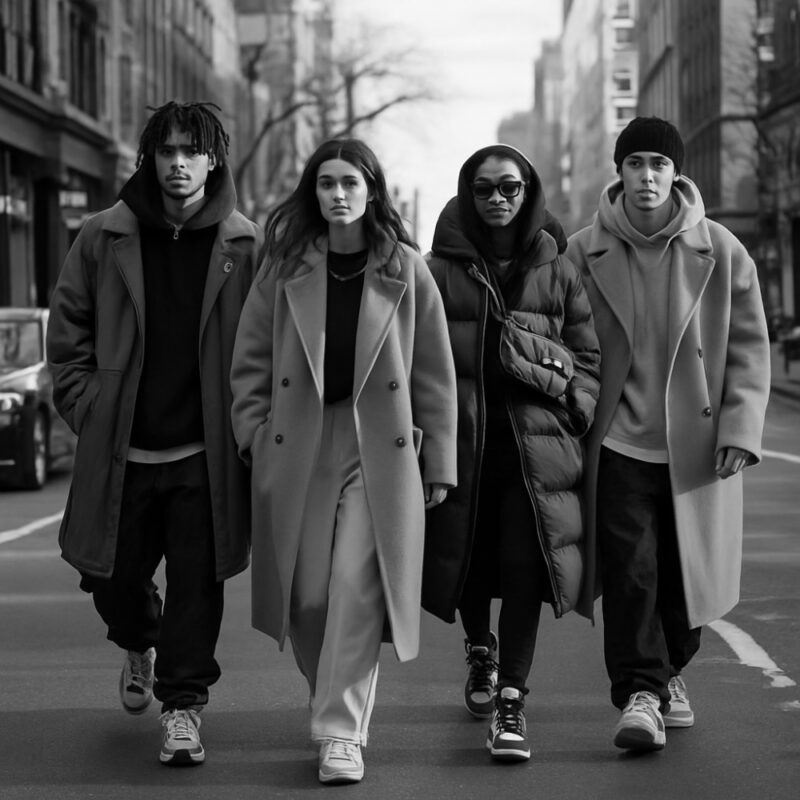-
×
 Have a Nice Day Beanie
1 × $111.00
Have a Nice Day Beanie
1 × $111.00
Fashion Born From the Streets
Street style has grown from a grassroots form of expression into one of the most important forces shaping what the world wears. The street style influence is now felt in designer collections, on social media, and across retail, proving that personal expression on the sidewalks can drive the global fashion industry forward.
The Roots of Street Style Influence
In its earliest form, streetwear was clothing chosen for practicality and identity rather than prestige. Skateboarders, hip-hop communities, and punk culture used fashion as a way to stand apart from mainstream expectations. Over time, these communities transformed everyday items like sneakers, hoodies, and graphic tees into cultural symbols. As a result, their impact stretched far beyond their original scenes, laying the foundation for the powerful street style influence seen today.
Street Style Influence on Runways
Runways were once the birthplace of trends. Today, however, designers often borrow directly from the street. Luxury houses reinterpret oversized silhouettes, distressed denim, and sportswear-inspired shapes after spotting them in everyday life. Consequently, the old hierarchy has been reversed: high fashion now responds to what people wear outside its doors instead of dictating trends from above.
Social Media as the Modern Catwalk
Fashion capitals are no longer limited to Paris, Milan, or New York. Thanks to Instagram and TikTok, a single viral video can spark a look that spreads worldwide overnight. In addition, influencers and everyday creators alike amplify the reach of new outfits. Their voices ensure authentic ideas gain visibility far beyond the city block where they first appeared.
Cultural Icons of Streetwear
Streetwear has also been shaped by cultural figures. Musicians like Kanye West, Rihanna, and A$AP Rocky helped bring urban fashion into luxury spaces. Meanwhile, athletes partnered with sneaker brands to create limited releases that blurred the line between sport and style. These collaborations made streetwear aspirational while keeping it connected to its cultural roots.
Blending Comfort With High Fashion
Modern elegance is no longer defined only by rigid tailoring. Instead, people are mixing hoodies with structured coats, pairing sneakers with dresses, and using oversized pieces as bold statements. This blend reflects a cultural shift toward comfort without losing sophistication. Therefore, the street style influence continues to reshape what it means to look refined in today’s world.
The Business of Streetwear
What started as subculture has become an economic powerhouse. Limited sneaker drops sell out in minutes, while streetwear brands collaborate with luxury houses to reach new audiences. Furthermore, reselling platforms have turned hype into an entire industry. Fashion labels recognize that aligning with authenticity builds loyalty — and consumers reward them with record sales.
Streetwear and Sustainability
Another growing layer of this movement is sustainability. Many emerging designers are reworking vintage pieces or using eco-friendly fabrics to create unique looks. For example, upcycled denim and patchwork hoodies bring fresh personality to everyday wear. This conscious approach reflects a generation that wants to stand out while also standing up for the planet, giving streetwear both cultural and ethical weight.
Global Voices in Street Style
Streetwear no longer belongs to one region. In Seoul, designers blend urban fashion with sleek minimalism. In Lagos, vibrant prints redefine what streetwear can look like. Meanwhile, São Paulo’s energetic youth culture inspires bold reinterpretations of classic pieces. Each city adds its own perspective, proving that global fashion is strongest when multiple voices contribute.
Street Style as Fashion’s Constant Pulse
Street style has moved from sidewalks to runways, from counterculture to billion-dollar business. Yet its essence remains unchanged: individuality, creativity, and authenticity. Therefore, the street style influence continues to prove that fashion’s true heartbeat begins not in ateliers but in everyday life.





